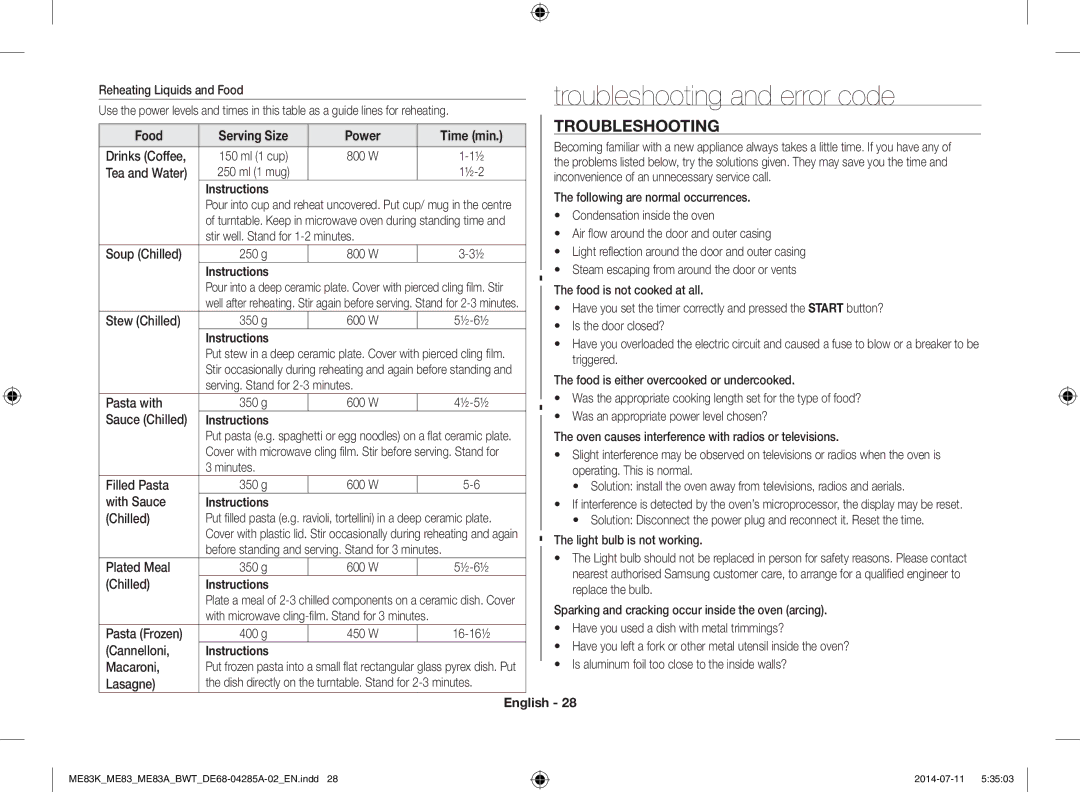
Reheating Liquids and Food
Use the power levels and times in this table as a guide lines for reheating.
Food | Serving Size | Power |
| Time (min.) |
|
|
|
|
|
Drinks (Coffee, | 150 ml (1 cup) | 800 W |
| |
Tea and Water) | 250 ml (1 mug) |
|
| |
| Instructions |
|
|
|
| Pour into cup and reheat uncovered. Put cup/ mug in the centre | |||
| of turntable. Keep in microwave oven during standing time and | |||
| stir well. Stand for |
| ||
Soup (Chilled) | 250 g | 800 W |
| |
| Instructions |
|
|
|
| Pour into a deep ceramic plate. Cover with pierced cling film. Stir | |||
| well after reheating. Stir again before serving. Stand for | |||
Stew (Chilled) | 350 g | 600 W |
| |
| Instructions |
|
|
|
| Put stew in a deep ceramic plate. Cover with pierced cling film. | |||
| Stir occasionally during reheating and again before standing and | |||
| serving. Stand for |
| ||
Pasta with | 350 g | 600 W |
| |
Sauce (Chilled) | Instructions |
|
|
|
| Put pasta (e.g. spaghetti or egg noodles) on a flat | ceramic plate. | ||
| Cover with microwave cling film. Stir before serving. Stand for | |||
| 3 minutes. |
|
|
|
Filled Pasta | 350 g | 600 W |
| |
with Sauce | Instructions |
|
|
|
(Chilled) | Put filled pasta (e.g. ravioli, tortellini) in a deep ceramic plate. | |||
| Cover with plastic lid. Stir occasionally during reheating and again | |||
| before standing and serving. Stand for 3 minutes. | |||
Plated Meal | 350 g | 600 W |
| |
(Chilled) | Instructions |
|
|
|
| Plate a meal of | |||
| with microwave |
| ||
Pasta (Frozen) | 400 g | 450 W |
| |
(Cannelloni, | Instructions |
|
|
|
Macaroni, | Put frozen pasta into a small flat rectangular glass pyrex dish. Put | |||
Lasagne) | the dish directly on the turntable. Stand for | |||
troubleshooting and error code
TROUBLESHOOTING
Becoming familiar with a new appliance always takes a little time. If you have any of the problems listed below, try the solutions given. They may save you the time and inconvenience of an unnecessary service call.
The following are normal occurrences.
•Condensation inside the oven
•Air flow around the door and outer casing
•Light reflection around the door and outer casing
•Steam escaping from around the door or vents
The food is not cooked at all.
•Have you set the timer correctly and pressed the START button?
•Is the door closed?
•Have you overloaded the electric circuit and caused a fuse to blow or a breaker to be triggered.
The food is either overcooked or undercooked.
•Was the appropriate cooking length set for the type of food?
•Was an appropriate power level chosen?
The oven causes interference with radios or televisions.
•Slight interference may be observed on televisions or radios when the oven is operating. This is normal.
•Solution: install the oven away from televisions, radios and aerials.
•If interference is detected by the oven’s microprocessor, the display may be reset.
•Solution: Disconnect the power plug and reconnect it. Reset the time.
The light bulb is not working.
•The Light bulb should not be replaced in person for safety reasons. Please contact nearest authorised Samsung customer care, to arrange for a qualified engineer to replace the bulb.
Sparking and cracking occur inside the oven (arcing).
•Have you used a dish with metal trimmings?
•Have you left a fork or other metal utensil inside the oven?
•Is aluminum foil too close to the inside walls?
